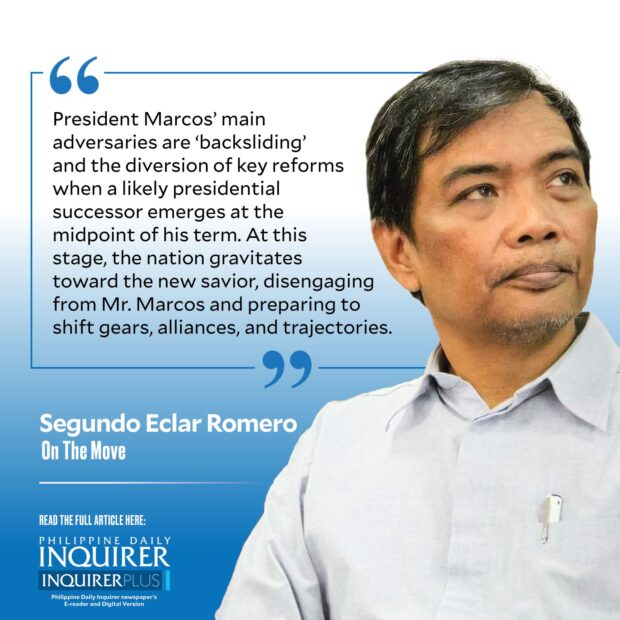The evolving landscape of Philippine politics
 The political landscape in the Philippines is characterized by two influential forces, symbolized by rivers, which shape the governance strategies and policies of President Marcos. These forces involve retracing and burnishing the governance of Marcos Sr., as well as deflecting and taming the flow of the Duterte administration. This column examines the potential outcomes and implications of these forces on the future of the Philippines.
The political landscape in the Philippines is characterized by two influential forces, symbolized by rivers, which shape the governance strategies and policies of President Marcos. These forces involve retracing and burnishing the governance of Marcos Sr., as well as deflecting and taming the flow of the Duterte administration. This column examines the potential outcomes and implications of these forces on the future of the Philippines.
During the first half of Marcos Sr.’s 21-year tenure (1965-1986), he laid a solid foundation for national policy. However, Congress, both then and now, lacked the courage, foresight, and patriotism to address the legislation needed to counter increasing insurgency and civil unrest. Nevertheless, Marcos Sr. introduced overdue reforms such as agrarian reform, bureaucracy restructuring, and cooperative strengthening. Additionally, his foreign policy aimed to enhance Philippine independence by opening more windows to the world while maintaining ties with the United States. Mr. Marcos, who witnessed this shift in foreign relations, is unlikely to be as beholden to Xi Jinping as Rodrigo Duterte was after being mesmerized by China’s president.
Marcos Sr. effectively used the branding of the “New Society” to instill a sense of patriotism among Filipinos. This campaign, employing ubiquitous slogans, songs, and posters, united the government, media, private sector, and communities. The emotional impact of this consciousness-molding endeavor still resonates with many Filipinos. Mr. Marcos now aims to replicate this success with his “Bagong Pilipinas” (New Philippines) campaign, which seeks to foster pride and trust in the government. The strategic theme and Marcosian style of this campaign have the potential to create a coherent image of a government moving forward.
Despite lacking the commanding presence of his father, Mr. Marcos should not be mistaken for an unwillingness to break ties with influential figures. His approach, characterized by the phrase “friends to all and enemies to none,” avoids confrontational stances at face-to-face encounters. However, this tactic resembles China’s approach toward the Philippines—“tulak ng bibig, kabig ng dibdib” (push with words but pull with action).
Duterte’s continued vocal presence through Apollo Quiboloy’s Sonshine Media Network International or SMNI, commenting on the likes of fugitive Gerald Bantag, only diminishes his stature. Associating with rogue personalities mattered little when he held the presidency, but now it paints a pathetic picture. Duterte should regain the limelight by participating in interviews with respected media personalities but the prospect is daunting due to the anticipated onslaught of online trolls.
China’s continued reliance on Duterte for support is a miscalculation. By failing to deliver on promised infrastructure and investment projects, while also neglecting a mutually beneficial arrangement in the West Philippine Sea, China undermined Duterte’s credibility. His strategy of appeasement, which appears to favor a “Philippines as a province of China” approach, has alienated the people who initially welcomed his presidency.
Despite his promising start, Mr. Marcos still faces uncertainties regarding the legitimacy of his May 2023 victory. Similar to the doubts surrounding Marcos Sr.’s presidency due to the irregular ratification of the 1973 Constitution, the legitimacy of the May 2022 results is still under some question. Additionally, his Maharlika Investment Fund poses risks, potentially endangering the public’s long-term financial security and survival. This rebranding of critical developmental and public services money as investible surplus raises concerns about a more insidious form of money laundering.
Mr. Marcos’ main adversaries are “backsliding” and the diversion of key reforms when a likely presidential successor emerges at the midpoint of his term. At this stage, the nation gravitates toward the new savior, disengaging from Mr. Marcos and preparing to shift gears, alliances, and trajectories.
The upcoming presidential election in May 2028 is expected to center around major policy issues, signaling a departure from the focus on personalities. Key areas of concern will likely include Philippine relations with China versus the US and its allies, food security and agriculture, energy, cost of living, housing availability and affordability, livelihood and education infrastructure, and law and governance. Moreover, this election will serve as a battleground between China and the US.
It is crucial to recognize the underestimated forces in nature and culture that manifest themselves with great impact. Just as rivers remember their pathways over eons, human attempts to build on floodplains often lead to destruction. Similarly, the evolving political dynamics in the Philippines, shaped by the interplay between Mr. Marcos, Duterte, and China, will undoubtedly reshape the nation’s future.
—————–
doyromero@gmail.com
















